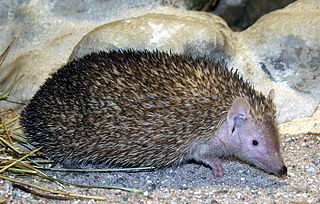
The clade Afrosoricida contains the golden moles of Southern Africa, the otter shrews of equatorial Africa and the tenrecs of Madagascar. These three groups of small mammals were for most of the 19th and 20th centuries regarded as a part of the Insectivora or Lipotyphla, but both of those groups, as traditionally used, are polyphyletic.
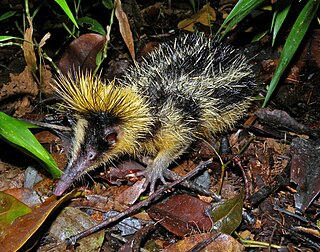
Tenrecomorpha is the suborder of otter shrews and tenrecs, a group of afrotherian mammals indigenous to equatorial Africa and Madagascar, respectively. The two families are thought to have split about 47–53 million years ago. Potamogalid otter shrews were formerly considered a subfamily of Tenrecidae. The suborder is also presumed to contain the extinct genus Plesiorycteropus, a group of possibly fossorial insectivores similar to aardvarks, which is known to be more closely related to tenrecs of subfamily Tenrecinae than to golden moles of suborder Chrysochloridea.

A tenrec is a mammal belonging to any species within the afrotherian family Tenrecidae, which is endemic to Madagascar. Tenrecs are a very diverse group; as a result of convergent evolution, some resemble hedgehogs, shrews, opossums, rats, and mice. They occupy aquatic, arboreal, terrestrial, and fossorial environments. Some of these species, including the greater hedgehog tenrec, can be found in the Madagascar dry deciduous forests. However, the speciation rate in this group has been higher in humid forests.
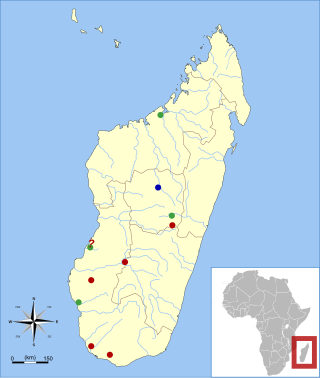
Plesiorycteropus, also known as the bibymalagasy or Malagasy aardvark, is a recently extinct genus of mammals from Madagascar. Upon its description in 1895, it was classified with the aardvark, but more recent molecular evidence instead suggests that it is most closely related to the tenrecs. Two species are currently recognized, the larger P. madagascariensis and the smaller P. germainepetterae. They probably overlapped in distribution, as subfossil remains of both species have been found in the same site.
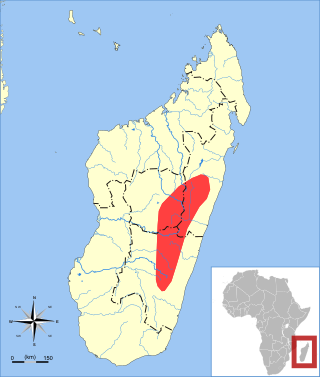
The web-footed tenrec, Malagasy otter shrew, or aquatic tenrec is the only known semiaquatic tenrec, and is found in eastern Madagascar, especially in and around Ranomafana National Park. It grows to between 25 and 39 cm, and was once thought to be extinct. It feeds on crabs, aquatic insects, and crayfish. The population is considered vulnerable. It was formerly placed in the monotypic genus Limnogale, but has been moved to Microgale based on molecular data showing it to be deeply nested within the latter.
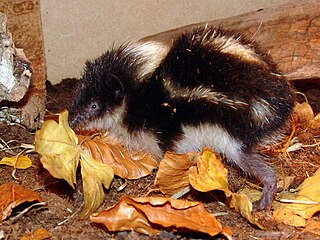
The highland streaked tenrec is an insectivore which lives in the central upland regions of Madagascar. Its black and white striped body is covered with quills, which it will raise when agitated. The spines detach and remain in the body of an inquisitive predator. The function of the black-and-white pattern may be to mimic juvenile Tenrec ecaudatus since the parents of this species are known to be aggressively protective, and the stripes may have developed as a type of camouflage while foraging. The highland streaked tenrec uses its long snout to burrow under leaves and bark, searching for earthworms, its primary food.

The tailless tenrec, also known as the common tenrec, is a species of mammal in the family Tenrecidae. It is the only member of the genus Tenrec. Native to Madagascar, it is also found on the Comoros, Mauritius, Réunion, and Seychelles island groups, where it has been purposely introduced. Its natural habitat is the understory of subtropical-tropical forest, open forest, arid shrub-land, savanna, arable land, pastures, crop plantations, private gardens, and some landscaped, urban areas.

The lesser hedgehog tenrec is a species of mammal in the family Tenrecidae. It is the only species in the genus Echinops and is named in honour of Charles Telfair. It is endemic to Madagascar. Its natural habitats are subtropical or tropical dry forests, shrubland, and shrubland and dry savanna.

The large-eared tenrec is a species of mammal in the family Tenrecidae. It is the only species in the monotypic genus Geogale, and the only member of the subfamily Geogalinae. It is endemic to Madagascar where its natural habitats are subtropical or tropical dry forests and shrubland. It is threatened by habitat loss, but to a lesser extent than was previously thought and is listed by the IUCN as being of "Least Concern".
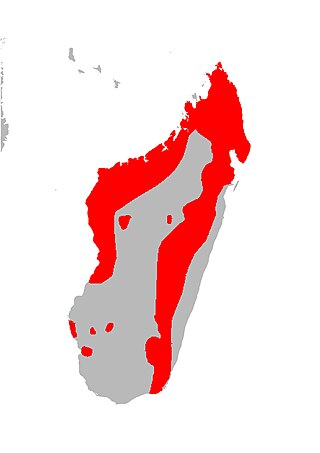
Microgale is a genus of mammal in the family Tenrecidae. There are 21 living species on the island of Madagascar and one extinct species known from a fossil. Some species have been discovered in the last twenty years.
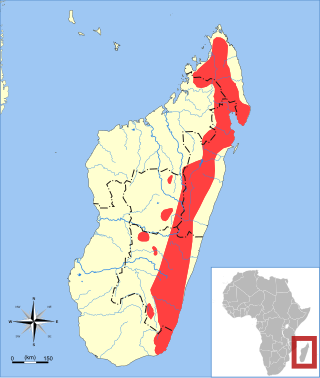
Dobson's shrew tenrec is a species of mammal in the family Tenrecidae. It is endemic to Madagascar. Its natural habitats are subtropical or tropical moist forests, plantations, and heavily degraded former forest. On the basis of molecular data indicating that it and Talazac's shrew tenrec form a sister group to the rest of Microgale, these two species were transferred from Microgale to Nesogale in 2016.

Talazac's shrew tenrec is a species of mammal in the family Tenrecidae. It is endemic to Madagascar. Its natural habitats are subtropical or tropical moist forests. On the basis of molecular data indicating that it and Dobson's shrew tenrec form a sister group to the rest of Microgale, these two species were transferred from Microgale to Nesogale in 2016.

The greater hedgehog tenrec, also known as the large Madagascar hedgehog or sokina, is a species of mammal in the family Tenrecidae. It is endemic to Madagascar. Its natural habitats are subtropical or tropical forests, shrubland and grassland, savanna, rural gardens, and urban areas.

The Mikea Forest is a forested region of southwestern Madagascar, between Manombo and Morombe. More specifically, it stretches from Route Nationale 9 to the west coast and from Mangoky south to the Manombo River. It lies at the transition between dry deciduous forest, which is more common further north in Madagascar, and spiny forest, which is dominant in southwestern Madagascar. Its underlying geology is unconsolidated sand, and the region contains several freshwater lakes. The Forêt des Mikea is one of the largest remaining continuous forest blocks in western and southern Madagascar, but it is not protected and it is threatened by human development.
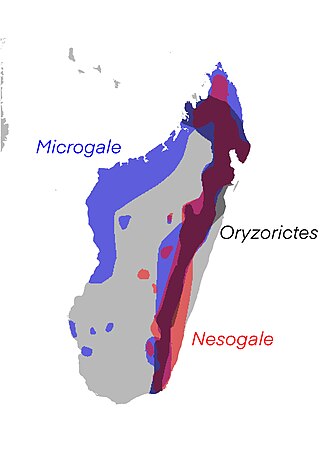
Oryzorictinae is a subfamily of tenrecs endemic to the island of Madagascar. It is the largest of three tenrec subfamilies. Oryzorictinae is thought to have split from the lineage of its closest relative, Geogale, about 30 million years (Ma) ago. The deepest phylogenetic split within the subfamily, that between Oryzorictes and a clade composed of Microgale plus Nesogale, is thought to have occurred about 28 Ma ago. In turn, Microgale and Nesogale are thought to have diverged about 19 Ma ago.

Hemicentetes is a genus of tenrec with two species, present on the island of Madagascar.
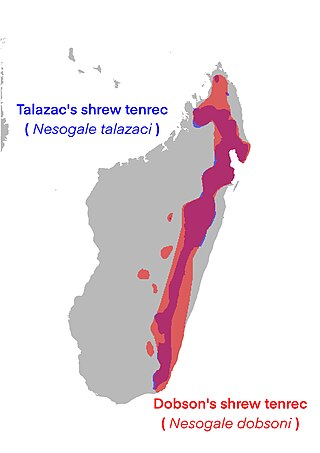
Nesogale is a genus of tenrecs, which are a family of afrotherian mammals endemic to Madagascar. On the basis of molecular data indicating its two species form a sister group to the rest of Microgale, they were transferred from Microgale to Nesogale in 2016, thus resurrecting a genus first erected by Oldfield Thomas in 1918. These genera, along with Oryzorictes, form the tenrec subfamily Oryzorictinae. Nesogale contains the following species:















